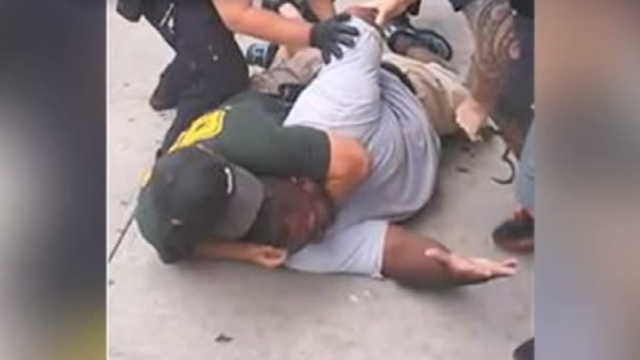On Wednesday, a Staten Island grand jury refused to indict New York City police officer Daniel Pantaleo in the death of 43-year-old Eric Garner. Pantaleo had used a chokehold — contrary to NYPD regulations –while attempting to arrest Garner for selling unlicensed cigarettes. Garner’s brutal death was caught on camera; In the video, he can be heard repeatedly telling the police, “I can’t breathe!”
In July, the New York City Medical examiner ruled that Garner’s death was a homicide caused by “compression of neck (chokehold), compression of chest and prone positioning during physical restraint by police.” But despite the grand jurors being given a variety of potential charges, they declined to hold him criminally accountable.
The decision comes a week after a St. Louis grand jury declined to prosecute Ferguson police officer Darren Wilson in the shooting death of unarmed Michael Brown.
Following that decision, The Atlantic’s Ta-Nehisi Coates, appearing this week in an encore broadcast of Moyers & Company, wrote about the inherent challenge Barack Obama faces as the first black president to address the issue of police violence and the African-American community during a period of heightened racial tension.
For Coates, the problem isn’t what Obama says after incidents like these, but what he can’t — or won’t — tell the American public. Coates:
In a recent dispatch from Ferguson, Missouri, Jelani Cobb noted that President Obama’s responses to “unpunished racial injustices” constitute “a genre unto themselves.” Monday night, when Barack Obama stood before the nation to interpret the non-indictment of Darren Wilson for the killing of Michael Brown, he offered a particularly tame specimen. The elements of “the genre” were all on display—an unmitigated optimism, an urge for calm, a fantastic faith in American institutions, an even-handedness exercised to a fault. But if all the limbs of the construct were accounted for, the soul of the thing was not.
There was none of the spontaneous annoyance at the arrest of Henry Louis Gates, and little of the sheer pain exhibited in the line, “If I had a son, he’d look like Trayvon.” The deft hand Obama employed in explaining to Americans why the acquittal of George Zimmerman so rankled had gone arthritic. This was a perfunctory execution of “the genre,” offered with all the energy of a man ticking items off a to-do list.
Barack Obama is an earnest moderate. His instincts seem to lead him to the middle ground. For instance, he genuinely believes that there is more overlap between liberals and conservatives than generally admitted. On Monday he nodded toward the “deep distrust” that divides black and brown people from the police, and then pointed out that this was tragic because these are the communities most in need of “good policing.” Whatever one makes of this pat framing, it is not a cynical centrism—he believes in the old wisdom of traditional America. This is his strength. This is his weakness. But Obama’s moderation is as sincere and real as his blackness, and the latter almost certainly has granted him more knowledge of his country than he generally chooses to share.
In the case of Michael Brown, this is more disappointing than enraging. The genre of Obama race speeches has always been bounded by the job he was hired to do. Specifically, Barack Obama is the president of the United States of America. More specifically, Barack Obama is the president of a congenitally racist country, erected upon the plunder of life, liberty, labor, and land. This plunder has not been exclusive to black people. But black people, the community to which both Michael Brown and Barack Obama belong, have the distinct fortune of having survived in significant numbers. For a creedal country like America, this poses a problem—in nearly every major American city one can find a population of people whose very existence, whose very history, whose very traditions, are an assault upon this country’s nationalist instincts. Black people are the chastener of their own country. Their experience says to America, “You wear the mask.”
There’s more at The Atlantic. Read the whole thing.


